Give Your Body a Break with 12 Meatless Protein Sources
A recent Care2 newsletter got my attention. It explained, "Contrary to popular misconception, you don't need to devour a 16-ounce T-Bone steak to fulfill your daily protein quota. In fact, you don't need any meat at all." I appreciated the validation to what I've known all along. And since I get a LOT of mail from our readers asking for more vegan and vegetarian information, I thought I'd pass on this latest Care2 information about 12 excellent meatless protein sources.
Whether you're a full-blown vegetarian or a longtime carnivore just wanting to give your body a break by cutting back on your meat consumption, these 11 meatless foods are good sources of healthy, high-quality protein. (Thanks to Care2 for this super inspiration!)

First on the list, quinoa, logging in at 8 g of protein per cup. Although typically confused with a grain, quinoa is technically a seed-which is why it's naturally gluten-free and high in fiber. What's more, this all-star superfood is a complete protein, meaning it contains all 9 essential amino acids the body needs for growth and repair. With a subtle nutty flavor and chewy texture, quinoa makes a great substitution for rice or cous cous. We love to stuff winter squash and tomatoes with a mixture of quinoa, whole kernel corn, chopped red pepper and onions, and diced mushrooms. Any combination of veggies is good with quinoa, though.
Next up is chia seed, which contains 4 grams of protein per 2 tablespoons. Small but mighty, chia seeds are a powerhouse of protein, omega-3s, fiber and minerals. By weight, they are about 14% protein, which is very high by plant food standards. High in water content, chia seeds are also widely touted for suppressing appetite and losing weight. Soak chia seeds in oatmeal overnight for a rich, creamy texture. I include 3 tablespoons in my green drink every morning and I use chia gel as an egg substitute when baking (3 tablespoons chia seed soaked for at least 15 minutes in 1 cup of cool water).
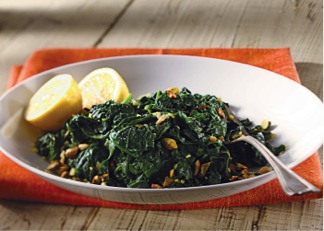
Spinach is number three on the list, at 5 grams of protein per one cup. Besides all the muscle-building protein, it also contains loads of vitamin A, calcium and iron. Pretty impressive for a leafy green, huh?
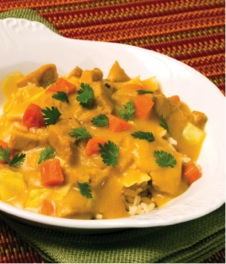
Seitan is in the running also. It has 36 grams of protein per half cup. Never heard of it? It's a meat substitute made from wheat gluten that's been seasoned with salt and savory flavors. Texture-wise, seitan is chewy and dense, similar to a jerky; in terms of taste, it's incredibly versatile and adopts the flavors of the seasonings that are used and the food it is mixed with.
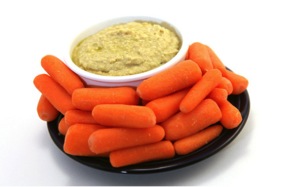
Hummus and Pita, at 7 grams per 1 whole-wheat pita and 2 tablespoons of hummus, is always a favorite. It is a go-to healthy appetizer. And when paired with whole wheat pitas the nutrition skyrockets-this combo supplies all nine essential amino acids. It's incredibly delicious and surprisingly easy to make.
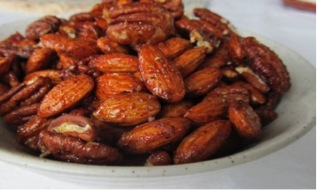
Nuts are next, offering 5 to 7 grams of protein per ¼ cup serving. Peanuts, almonds, cashews and other nuts are all fantastic sources of meat-free protein. Because they're rich in healthy fats and omega-3s, nuts are great for suppressing hunger.
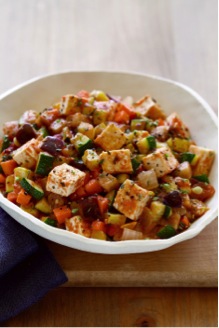
Tofu continues to grow in popularity for good reason-10 grams of protein per ½ cup serving, for starters. Made from curdled soybean milk-which probably isn't the most appetizing description of all time-tofu is an extremely healthy, versatile protein choice for vegetarians and meat eaters alike. It's a spongy food that holds up well to stir-fries, sautés, puddings, sauces, and so much more. Pictured is a tofu ratatouille that's as delicious as it is pretty.
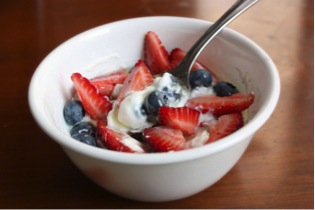
Then there's Greek yogurt, with 15 to 20 grams of protein per serving. Wow! All the nutritional hype surrounding Greek yogurt is legitimate. With more than double the protein of regular yogurt strains, Greek yogurt is a tasty way to amp up your protein content. It's also rich in bone-building calcium. But caution: For true nutrition, steer clear of sugary Greek yogurt varieties and stir fresh berries into the plain type.

Edamame also deserves to be on the list, at 17 grams of protein per cup. If processed soy products weird you out, give edamame a try. A mainstay at sushi restaurants, edamame is a complete protein that's high in fiber, vitamins and minerals. Throw some on a salad, or snack on them out of the shell. Or, create a delicious salad with edamame as the centerpiece, as pictured.
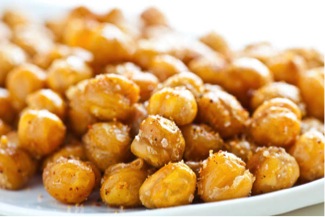
Chickpeas, with 6 grams of protein per half cup serving, is another meatless mainstay. Rich in fiber and protein, chickpeas-also called garbanzo beans-are the backbone of hummus and are great in curries and as salad toppers. We love them seasoned and roasted as pictured.
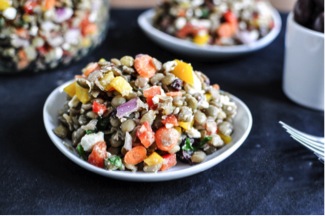
Lentils pack a whopping 18 grams of high-quality protein per one-cup serving. They also provide more than half your dietary fiber needs, lots of folate, vitamin B1, and plenty of minerals. They are delicious cold in salads or hot in soups and stews. I love to combine them with brown basmati rice and quinoa as a stuffing for winter squash. They're so versatile and just delicious.
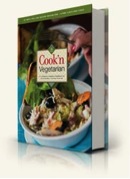
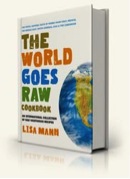

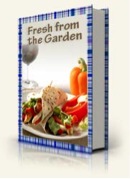
Finally, in addition to the above ideas, you'll find plenty of meatless support in these great DVO cookbooks, too. Whatever your leaning, meat-wise, though, it's always wise to give your body a break and insert a meatless meal into the week if you can!
- www.care2.com
- www.steamykitchen.com
 Alice Osborne
Alice Osborne
Weekly Newsletter Contributor since 2006
Email the author! alice@dvo.com
